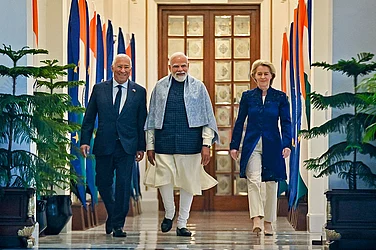Climate talks are set to begin today as the world gathers in Dubai, the Gulf city known for its carbon-heavy lifestyle as the UN climate summit, COP28, kicks off.
The choice of this year's host, the United Arab Emirates, has raised widespread concerns as one of the world's top oil-producing nations. And the fact that Sultan Al-Jaber, head of the national oil company, is at the forefront of the summit offers little reassurance in alleviating concerns.
The conference which is yet to begin is already mired in controversy as the Centre for Climate Reporting claimed leaked documents revealed JAl-aber had plans to discuss boosting fossil fuel business at the conference.
Why are their concerns about UAE hosting COP28?
UAE ranks high among oil-producing nations in the world and similar to gas and coal, oil is a fossil fuel associated with the generation of greenhouse gases, including carbon dioxide, a primary contributor to climate change.
The oil state draws at least 30 per cent of its GDP directly from oil and gas, with other streams of revenues including other industries heavily linked to fossil fuel consumption, such as airlines, tourism or construction.
In the past, UAE has also been accused of greenwashing in its attempts to highlight significant investments in renewables and other sustainable projects. However, these efforts do not mask the reality that, like any other oil-producing nation, the environmental impact of its fossil fuel extraction practices remains a significant concern.
UAE has committed to a net zero target by 2050 but no clear plan has been set out to achieve the goal considering it has crude oil reserves of 111 billion barrels. The nation of 10 million people has one of the world’s highest emissions rates per capita — ahead of the likes of Australia and the US.
With the UAE in charge of steering this year’s global climate negotiations, climate activists fear the conference may transform into an expo for the fossil fuel industry.
Who is Sultan Jaber?
Emirati politician Sultan Al-Jaber is Abu Dhabi National Oil Company’s (ADNOC) head. In December 2022, he was appointed to lead the UN Climate summit amid severe backlash from environmental experts. According to data, Jaber has the largest net-zero-busting expansion plans of any company in the world.
Experts have cited a major conflict of interest appointing the very person for climate talks who invests heavily in the fossil fuel industry.
Al-Jaber has a PhD in business and economics from Britain's Coventry University. He also studied in the United States. Jaber has led the UAE's climate diplomacy since 2020, and before that between 2010-2016. He is also the chair of Masdar, a renewable energy firm operating in over 40 countries.
Controversy ahead of COP28
On Monday, UK-based Centre for Climate Reporting(CCR) revealed leaked documents claiming The United Arab Emirates’ team organising the COP28 climate talks was planning to use its position as host of the summit to strike new oil and gas deals with foreign governments.
“CCR, working alongside the BBC verified the authenticity of the documents leaked by the whistleblower, who came forward on the condition of anonymity for fear of retaliation,” the report stated.
Responding to the allegations, a COP28 spokesperson said, “Dr Sultan holds a number of positions alongside his role as COP28 President-Designate. That is public knowledge. Private meetings are private, and we do not comment on them.”
Sultan Al Jaber has strongly denied accusations. “These allegations are false, not true, incorrect, and not accurate,” he said at a press conference in Dubai earlier this afternoon, when asked for comment by a reporter. “And it’s an attempt to undermine the work of the COP28 presidency.”


























